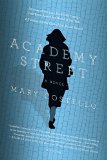Summary | Excerpt | Reading Guide | Reviews | Beyond the book | Read-Alikes | Genres & Themes | Author Bio

A deeply moving novel that follows a cast of characters as they negotiate one of Manhattan's swiftly changing neighborhoods, extreme weather, and the unease of twenty-first-century life.
From the National Book Award nominee and author of the acclaimed, New York Times bestselling A Short History of Women, a deeply moving, "lyrical, ominous, and unexpectedly funny" (Tom Perrotta, author of The Leftovers) novel that follows a cast of characters as they negotiate one of Manhattan's swiftly changing neighborhoods, extreme weather, and the unease of twenty-first-century life.
Marie and Simone, friends for decades, were once immigrants to the city, survivors of World War II in Europe.
Now widows living alone in Chelsea, they remain robust, engaged, and adventurous, even as the vistas from their past interrupt their present. Helen is an art historian who takes a painting class with Marie and Simone. Sid Morris, their instructor, presides over a dusty studio in a tenement slated for condo conversion; he awakes the interest of both Simone and Marie. Elizabeth is Marie's upstairs tenant, a woman convinced that others have a secret way of being, a confidence and certainty she lacks. She is increasingly unmoored - baffled by her teenage son, her husband, and the roles she is meant to play.
In a chorus of voices, Kate Walbert, a "wickedly smart, gorgeous writer" (The New York Times Book Review), explores the growing disconnect between the world of action her characters inhabit and the longings, desires, and doubts they experience. Interweaving long narrative footnotes, Walbert paints portraits of marriage, of friendship, and of love in its many facets, always limning the inner life, the place of deepest yearning and anxiety. The Sunken Cathedral is a stunningly beautiful, profoundly wise novel about the way we live now.
Rather than swamp this review with further adjectives, I will simply say that I haven't read a book this beautifully written since Ondaatje's The English Patient. While I'm sure this book won't appeal to everyone, I'm certain that lovers of contemporary, literary fiction will enjoy this novel immensely, and I cannot recommend it more highly...continued
Full Review
(596 words)
This review is available to non-members for a limited time. For full access,
become a member today.
(Reviewed by Davida Chazan).
Kate Walbert's The Sunken Cathedral is an impressionistic novel. But what does that mean?
 When we hear the word impressionism, the first things that come to mind are the names Monet, Degas, Cezanne and other artists who were part of this movement of painting and sculpture during the late 19th century. Their unique use of color and style, combined with their ability to express their impression of how they saw the world through their art, was a break from the realistic, practically photographic pieces of the Realism period that preceeded and overlapped with Impressionism.
When we hear the word impressionism, the first things that come to mind are the names Monet, Degas, Cezanne and other artists who were part of this movement of painting and sculpture during the late 19th century. Their unique use of color and style, combined with their ability to express their impression of how they saw the world through their art, was a break from the realistic, practically photographic pieces of the Realism period that preceeded and overlapped with Impressionism.
 At about the same time, this movement also spilled over into the world of music. Most people believe that composers Ravel and Debussy were at its forefront (although ...
At about the same time, this movement also spilled over into the world of music. Most people believe that composers Ravel and Debussy were at its forefront (although ...
This "beyond the book" feature is available to non-members for a limited time. Join today for full access.

If you liked The Sunken Cathedral, try these:

by Richard Wagamese
Published 2016
Written in luminous prose and infused by an uncommonly rich sense of place, Medicine Walk is a stunning achievement.

by Mary Costello
Published 2016
A vibrant, intimate, hypnotic portrait of one woman's life, from an important new writer.
The moment we persuade a child, any child, to cross that threshold into a library, we've changed their lives ...
Click Here to find out who said this, as well as discovering other famous literary quotes!